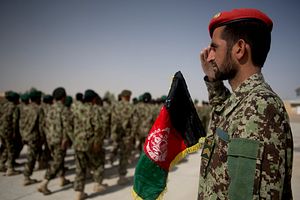Afghan President Ashraf Ghani undertook the unprecedented initiative of arresting warlords who were keeping illegal armed groups in different parts of the country. The warlords — many sprung from groups that fought the Soviets and engaged in civil war after the communist regime collapsed in 1992 — have hounded their local publics, engaged in illicit trade, and challenged the central government.
The hunt for warlords commenced with the capture of Nizamuddin Qaisari, district police chief and a trusted commander of de facto exiled First Vice President Abdul Rashid Dostum. Following the arrest of the powerful local commander, the authorities went on to detain a number of other local power brokers for alleged engagement in drug trafficking, maintaining illegal armed groups, extortion, kidnapping and supporting the Taliban.
Although Qaisari’s supporters have been engaged in agitation in Faryab and Samangan provinces since his detention, the Afghan public in general has hailed government’s quest for displacing the warlords from their power bases and dealing with their illegal armed groups. Afghans on social media have welcomed the government’s initiative.
However, despite support from the general public, action against the warlords will not be without serious challenges to the Ghani administration. Many of Afghanistan’s 34 provinces are under the influence of one or more warlords, and each enjoys the blessings of some of the political elite; some so powerful that even an intrepid Ashraf Ghani will think twice before confronting them. The warlords benefit from political support and reciprocate by helping former guerrilla commanders sustain their local political base so that they preserve their relevance in national politics.
Conflict-ridden Afghanistan has been fragmented by ethnocentric politics. Political parties and politicians have aligned their agendas on ethnic lines, promoting themselves as custodians of their ethnic groups. Hence, every government reform agenda has faced opposition under the pretext of ethnic targeting fueling unease among the masses. The crackdown against warlords has already been projected by a number of leading figures as actions motivated by ethnic lines.
On the other side, the militias associated with the warlords are loyal to their leaders and are committed to protecting the interest of their patrons. As such, there is potential for illegal armed groups to engage in clashes with the security forces. At a time when the government is heavily engaged in combating the Taliban and fighting the so-called Islamic State-Khorasan Province (ISKP), opening a new front against illegal armed groups would further add to the perils of insecurity and instability in the country.
However, halting the operation against the warlords at this point will further embolden the warlords and their patrons and exponentially increase the threats posed by illegal militia groups. A reversal would further erode the already weak public confidence in the government. Therefore, for the crackdown to succeed, the government should devise a comprehensive strategy and proceed forward.
As part of the strategic approach to counter the warlords and their mercenaries, Ghani should secure the support of the international community. The engagement of international partners will help the government garner commitment of their moral and material support. In order to tackle the use of the “ethnic card,” the Ghani administration will have to impartially target warlords, regardless of their ethnic group.
Furthermore, the state media apparatus should ensure regular information flow about the crackdown against illegal armed groups and their leadership. Good reporting can dampen wild speculation. Meanwhile, the warlords should be handled through formal judicial processes, the details of which should be made public. Civil society organizations must buy-in to the process as activists can have significant influence in mustering public support.
The crackdown against warlords and their mercenaries at the provincial level is a cold move by Ghani. The decision was widely welcomed by the general public and different quarters of the society have shown great support. The challenge, however, is continuing and expanding the crackdown to deal equally with all of Afghanistan’s warlords. It will be important to recognize the perils attached to the process and tactfully tackle the challenges. Success of this effort will significantly contribute to an expansion of the government’s writ and control, enhance public confidence in the central government as well as state institutions, and contribute to building stability across the country.
Mushtaq Rahim is an independent political and security analyst and an expert on conflict management and peacebuilding. He has been working in Afghanistan for the past 16 years on the promotion of good governance with specific focus on security sector reforms and peacebuilding. He tweets @mushtaq_rahim

































